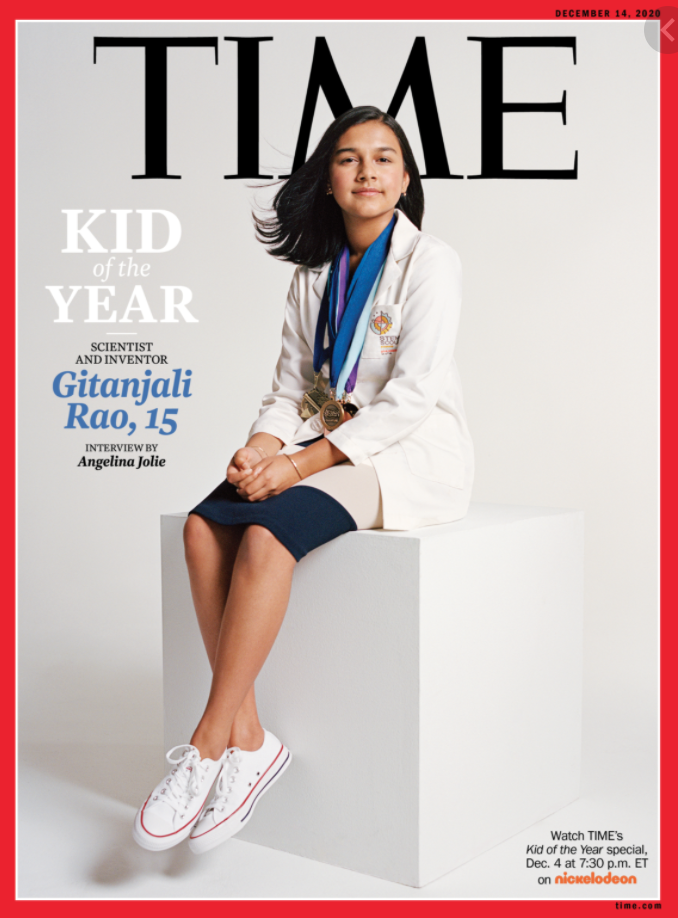
At just 14-years old, Gitanjali Rao is a 10th grader, a scientist, an inventor, and so much more. She is featured on the cover of Time Magazine this month, sitting next to the headline ‘Kid Of The Year.‘ When not attending the STEM School Highlands Ranch in Colorado, Rao is using genetic engineering to research prescription opioid addiction at the University of Colorado, Denver. She created a colorimetry device, has given multiple Ted Talks, and won awards for a device she developed to rapidly detect lead in water. The remarkable teenager was named as a Discovery Education 3M ‘Young Scientist Of The Year‘ in 2017.
Now, Rao is turning her attention to a problem that has an intense effect on people her own age, by using a scientific paradigm that we also use to solve problems here at UCIPT. The problem is cyberbullying. And the solution involves Machine Learning, a subset of AI. Specifically, Rao has developed an ‘anti-cyberbullying service’ that uses Natural Language Processing. She worked with Microsoft to launch the service called ‘Kindly.’
“There’s an app and a Chrome extension—which is able to detect cyberbullying at an early stage, based on artificial-intelligence technology,” Rao told Time Magazine this month. “I started to hard-code in some words that could be considered bullying, and then my engine took those words and identified words that are similar. You type in a word or phrase, and it’s able to pick it up if it’s bullying, and it gives you the option to edit it or send it the way it is.” The Kindly website notes that 1 in 5 students get cyberbullied and that the service is designed to make students feel safer. “The goal is not to punish,” Rao says. “As a teenager, I know teenagers tend to lash out sometimes. Instead, it gives you the chance to rethink what you’re saying so that you know what to do next time around.”
Kindness is something close to Rao’s heart. She is on the board of directors for the Children’s Kindness Network which is also committed to anti-bullying issues. That organization goes to elementary schools to lead workshops with students on the detrimental effect of bullying. Rao was asked during the interview for her Kid of the Year award – by Angelina Jolie, no less – whether people her own age would resist using the Kindly cyberbullying app on their phone. Rao said the feedback she has received from teenagers has been positive. “It seems like I’m being given an opportunity to learn from my mistakes,” Rao said of the reaction of her peers to Kindly. “So that’s what I was super excited about, that they understood what the goal of it was.”
Also of particular interest to us at UCIPT, is Rao’s work on opioid use disorder, a topic that we also research. Rao says her interest in the subject lies at the intersection of diagnosis and genetics. “I’m working on a product that helps to diagnose prescription-opioid addiction at an early stage based on protein production of the mu opioid receptor gene,” Rao says. “I’ve been really, really interested in genetics. That’s what I like, so that’s what I’m deciding to work on.”
Discovering and fostering passions in other people is a big part of what drives Rao forward. “I made this process that I use for everything now: it’s observe, brainstorm, research, build, communicate,” says Rao. “Now I’ve partnered with rural schools, girls in STEM organizations, museums all across the world, and bigger organizations like Shanghai International Youth Science and Technology group and the Royal Academy of Engineering in London, to run innovation workshops. The students that I work with, they just don’t know where to start. I think that if you give them that spark that they can then build off of, then that changes everything. That means one more person in this world wants to come up with ideas to solve problems.”
That is a mentality we can get behind here at UCIPT. And we can’t wait to see what Gitanjali Rao does next.
